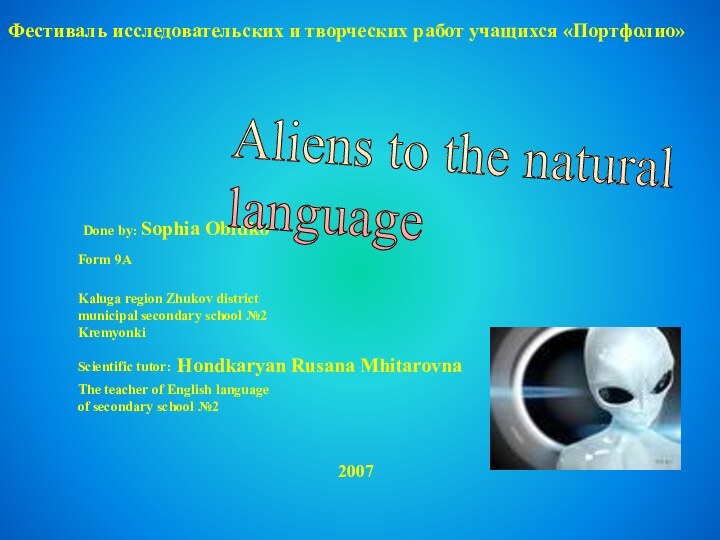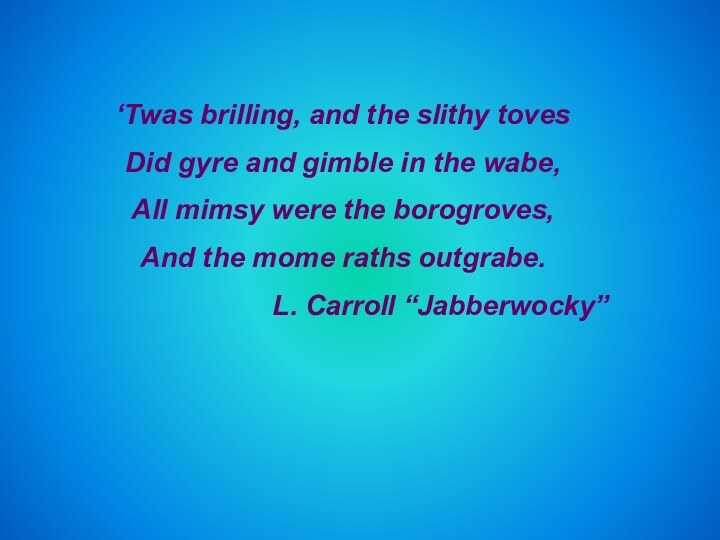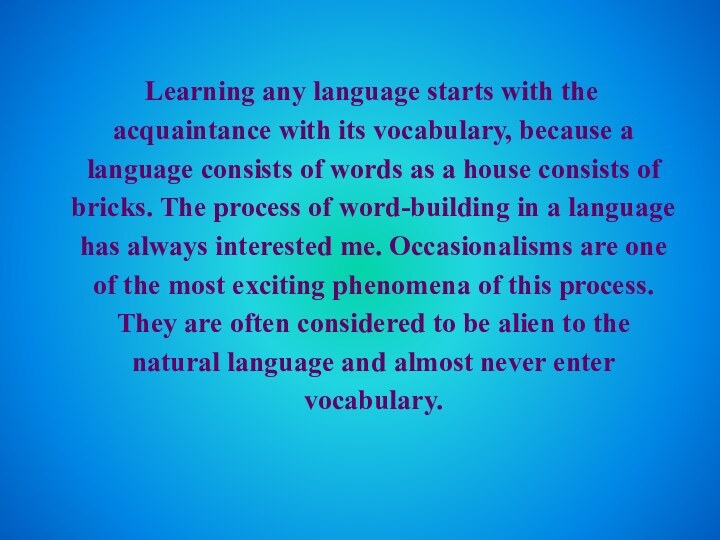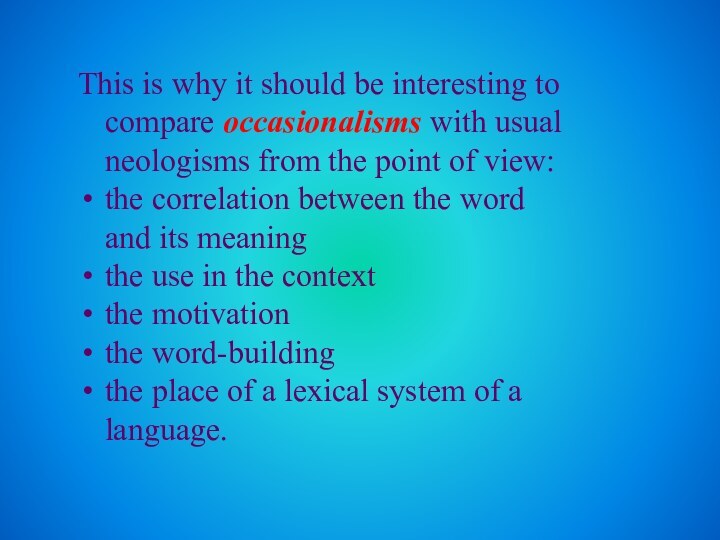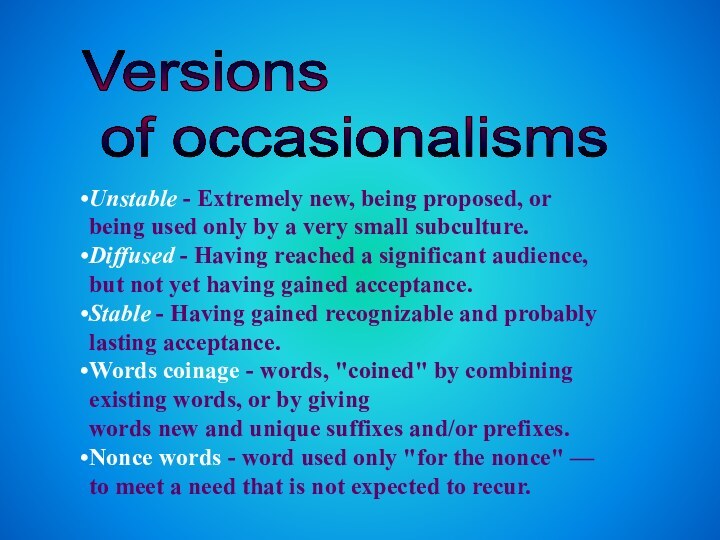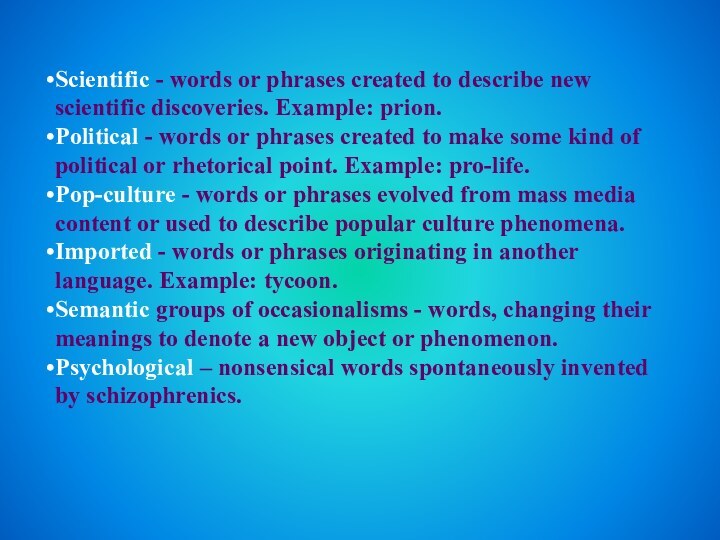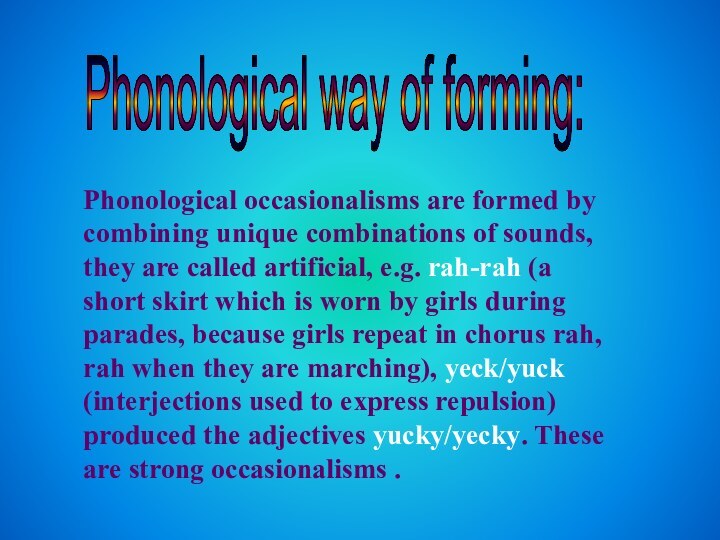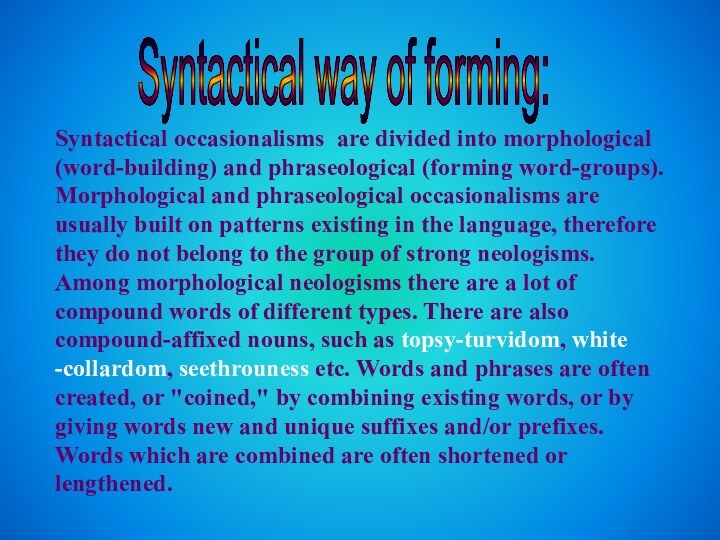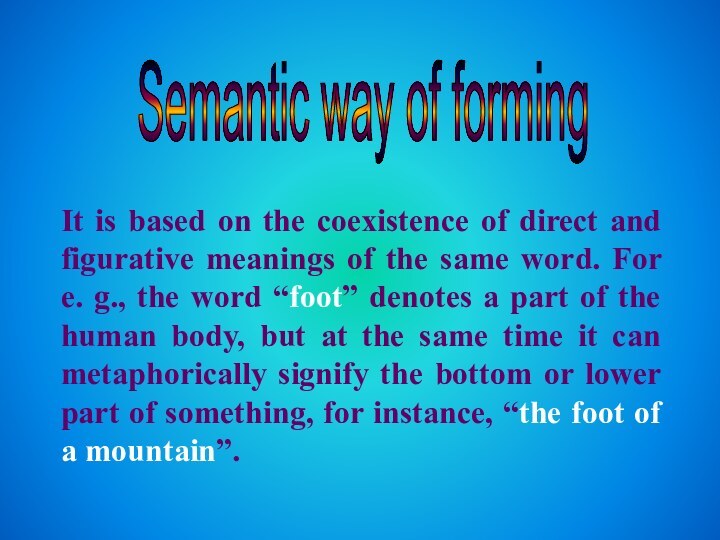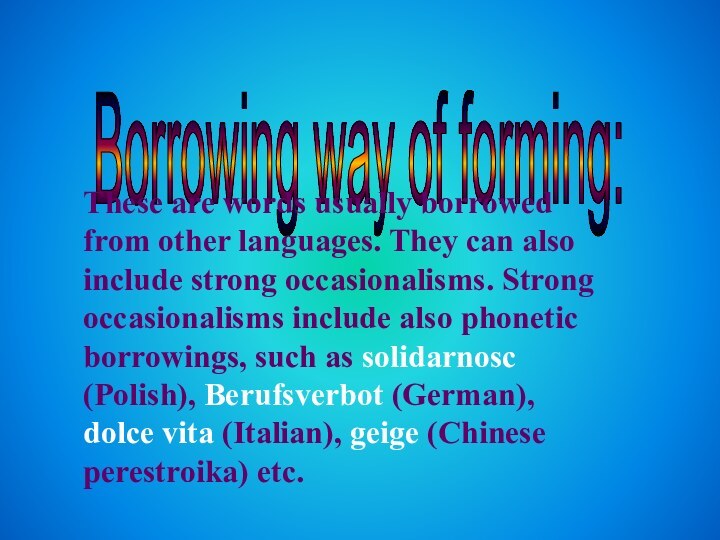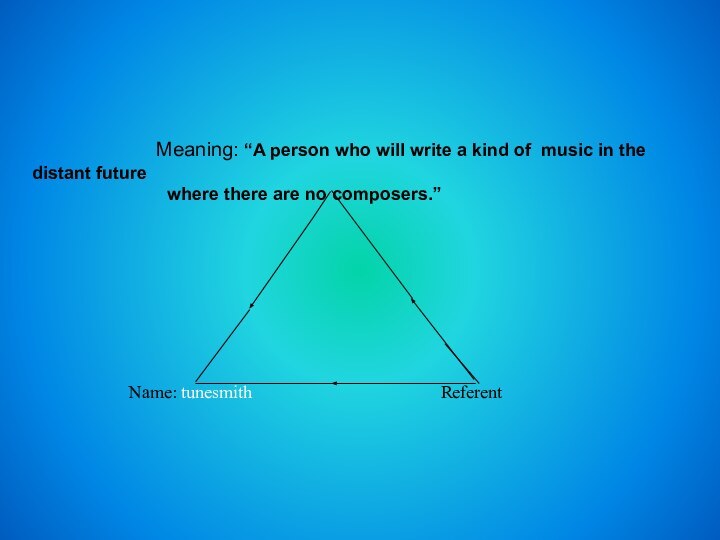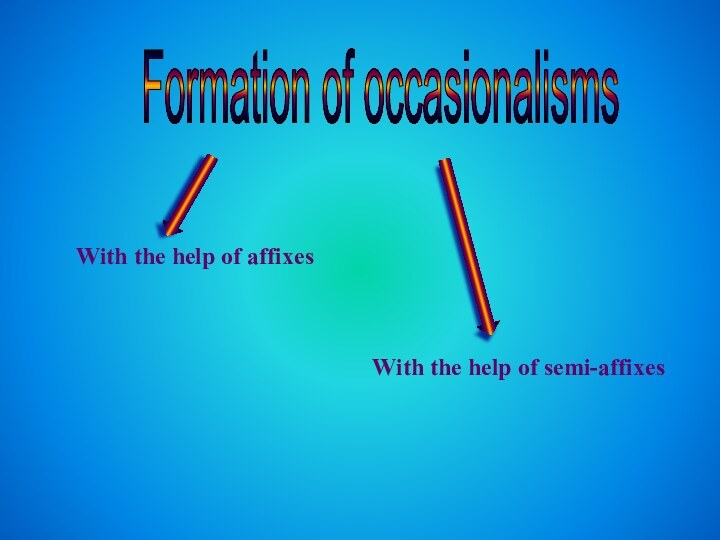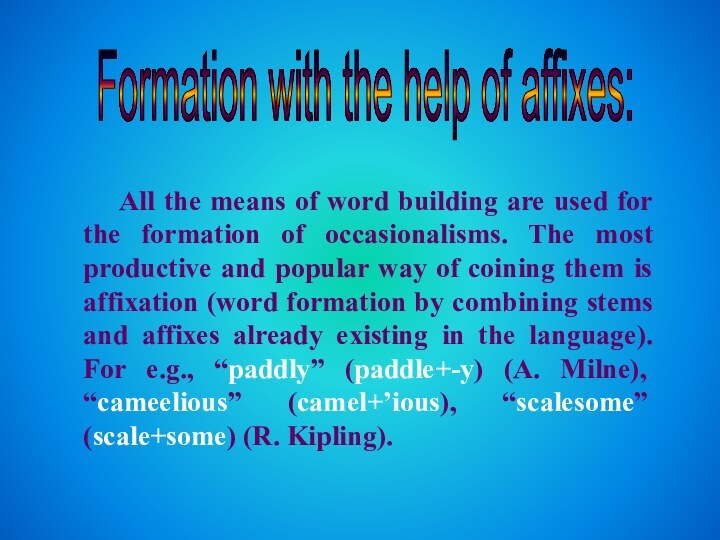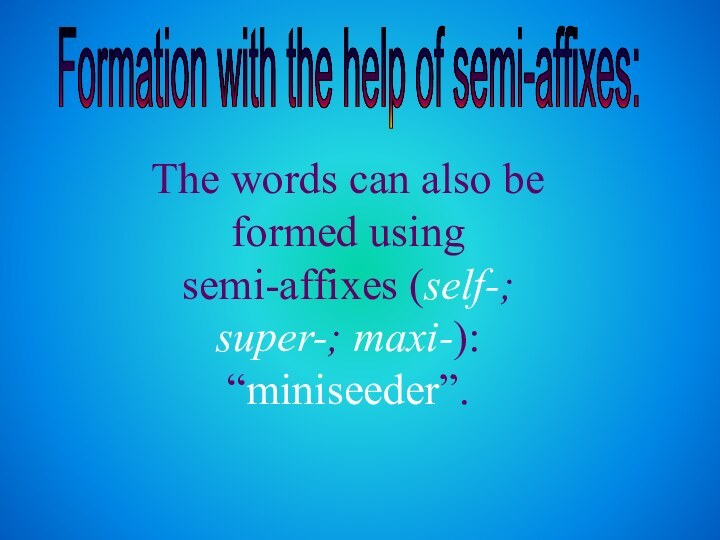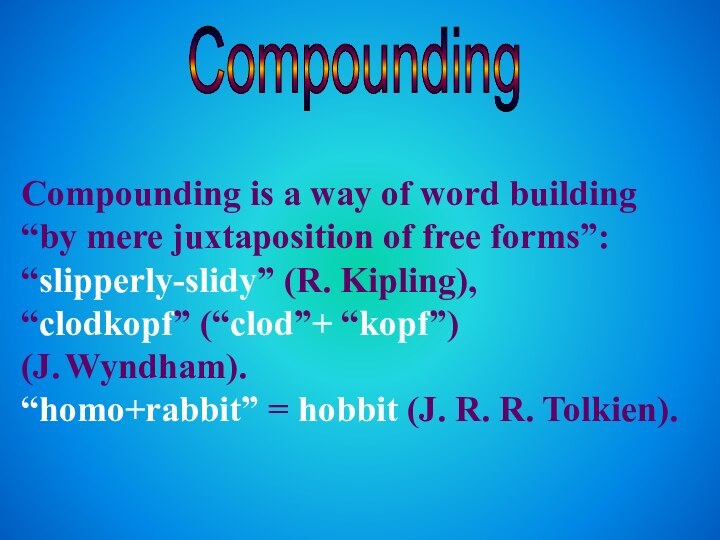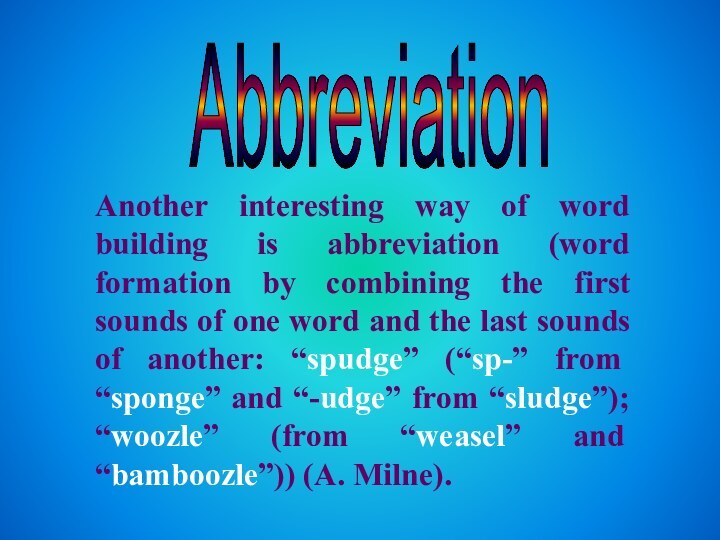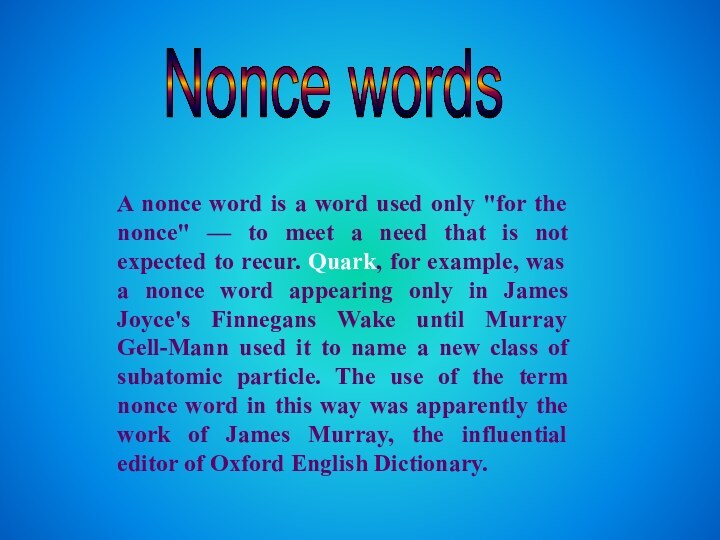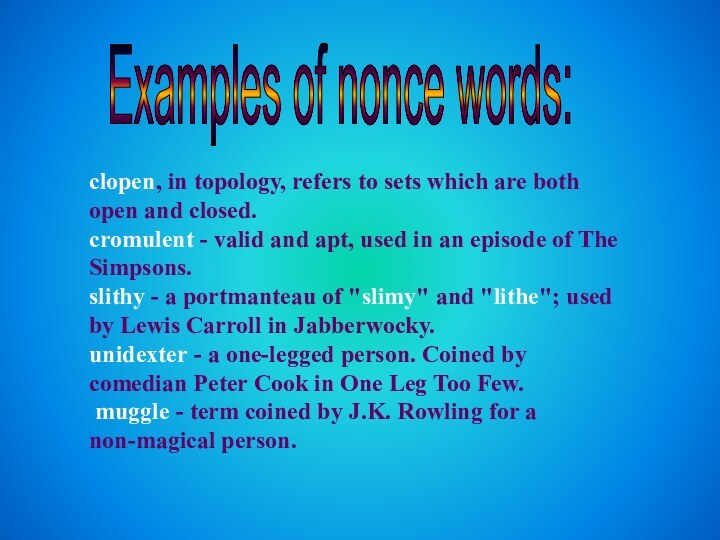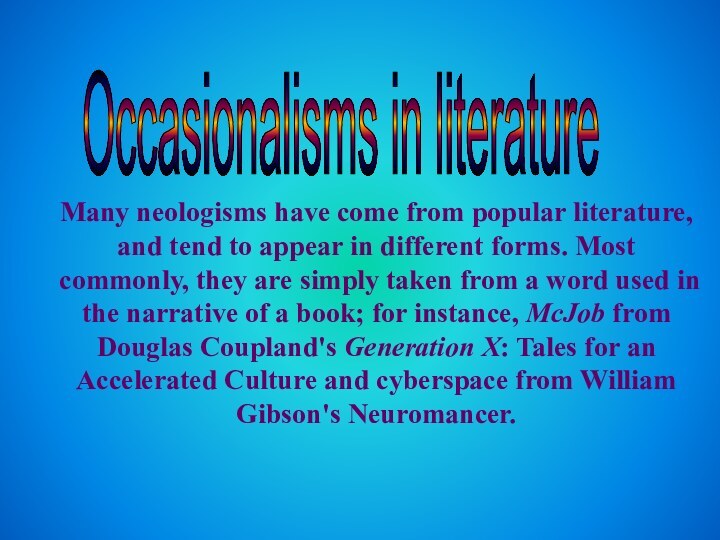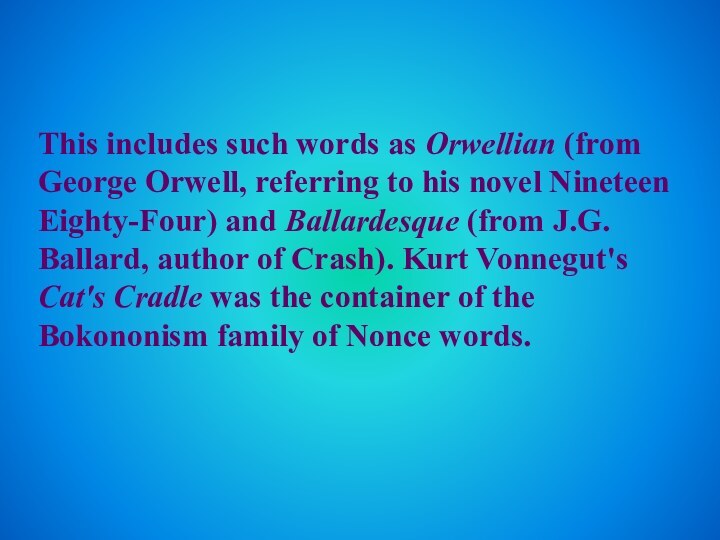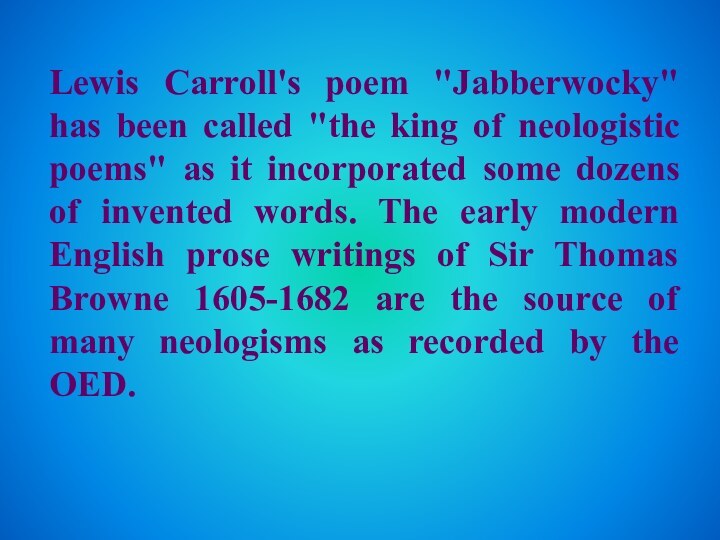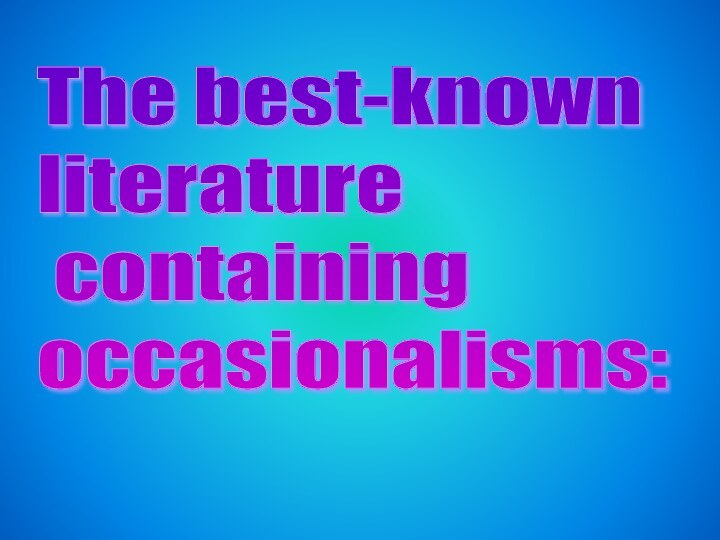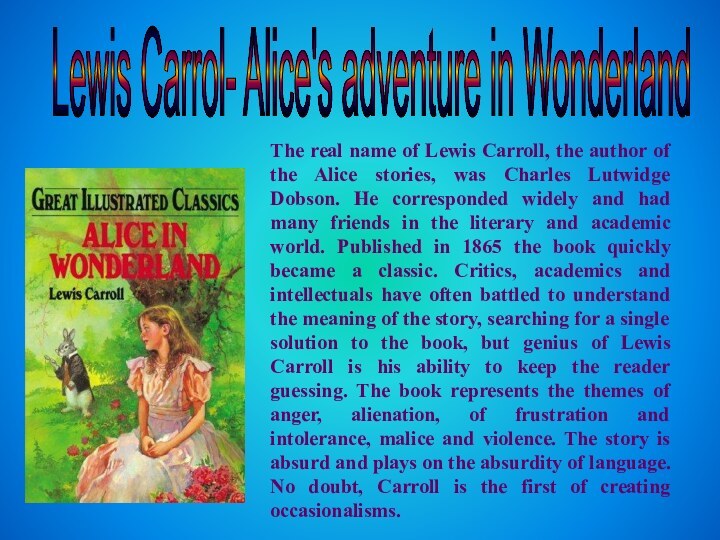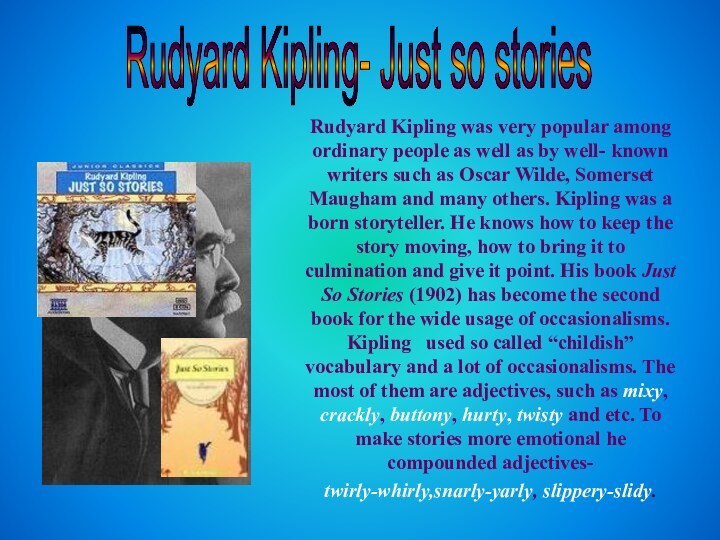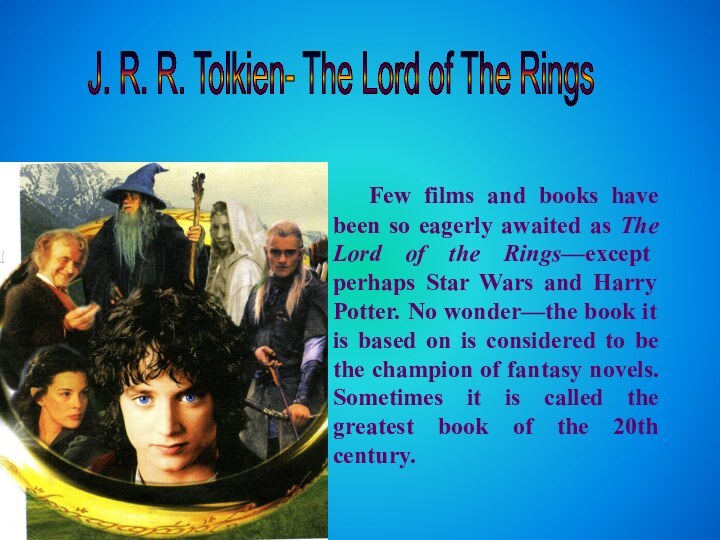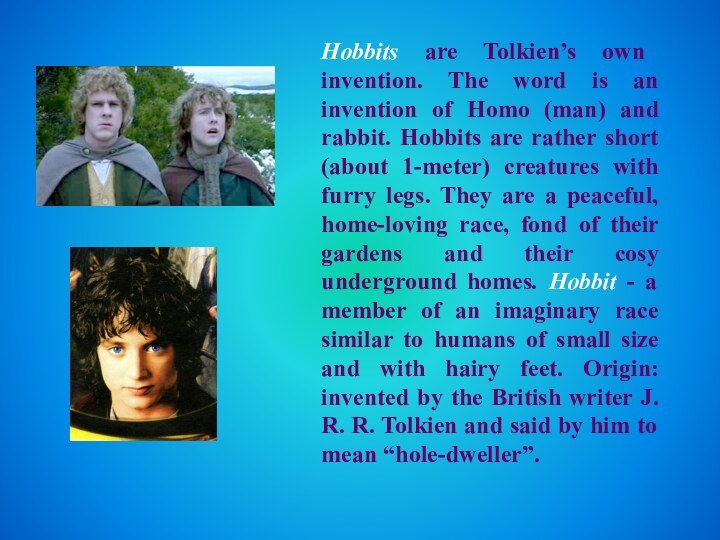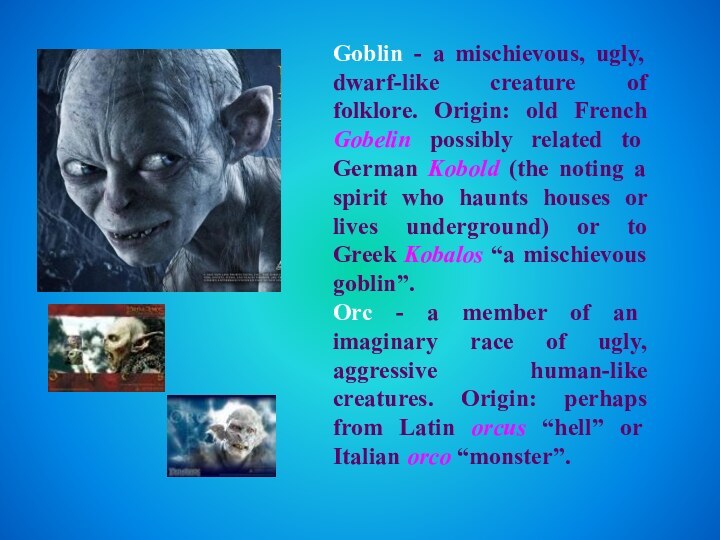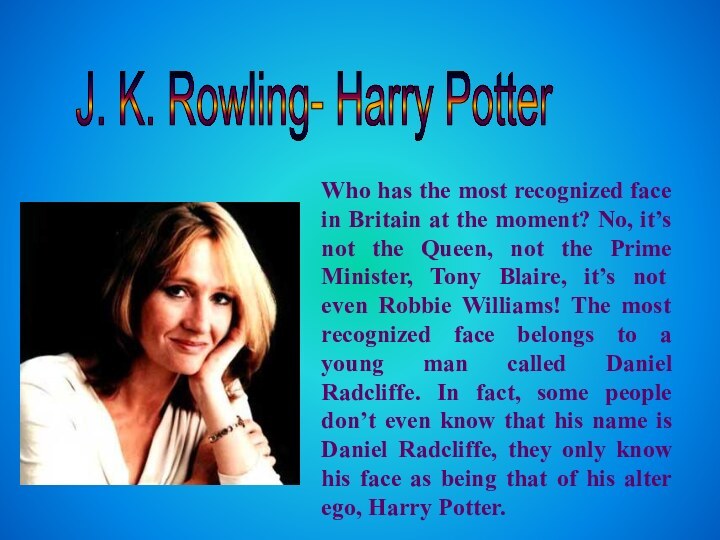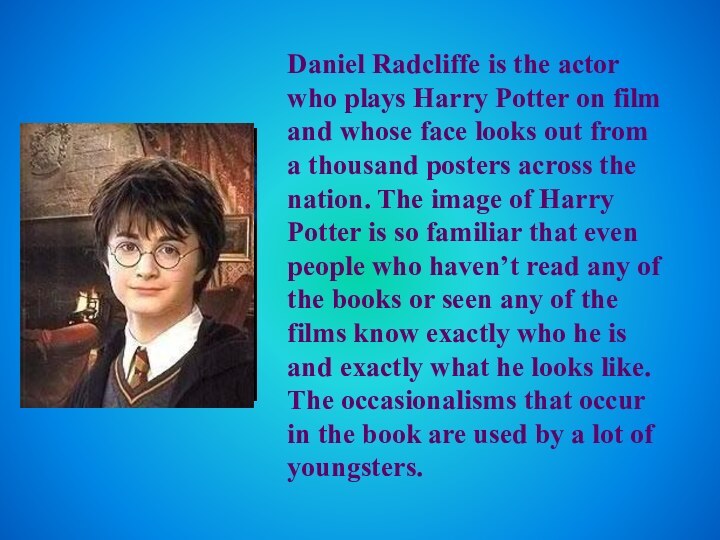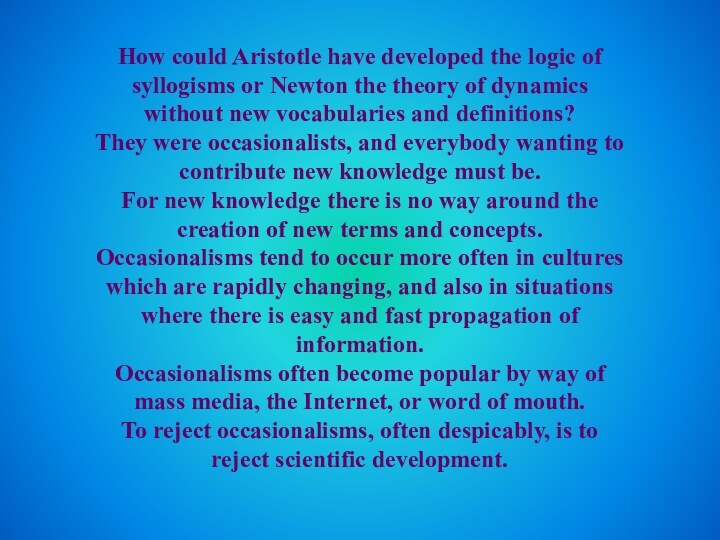Слайд 2
‘Twas brilling, and the slithy toves
Did gyre and
gimble in the wabe,
All mimsy were the borogroves,
And the
mome raths outgrabe.
L. Carroll “Jabberwocky”
Слайд 3
Learning any language starts with the
acquaintance with its vocabulary, because a language consists of
words as a house consists of bricks. The process of word-building in a language has always interested me. Occasionalisms are one of the most exciting phenomena of this process. They are often considered to be alien to the natural language and almost never enter vocabulary.
Слайд 4
This is why it should be interesting to
compare occasionalisms with usual neologisms from the point of
view:
the correlation between the word and its meaning
the use in the context
the motivation
the word-building
the place of a lexical system of a language.
Слайд 5
Unstable - Extremely new, being proposed, or being
used only by a very small subculture.
Diffused - Having
reached a significant audience, but not yet having gained acceptance.
Stable - Having gained recognizable and probably lasting acceptance.
Words coinage - words, "coined" by combining existing words, or by giving
words new and unique suffixes and/or prefixes.
Nonce words - word used only "for the nonce" — to meet a need that is not expected to recur.
Versions
of occasionalisms
Слайд 6
Scientific - words or phrases created to describe
new scientific discoveries. Example: prion.
Political - words or phrases
created to make some kind of political or rhetorical point. Example: pro-life.
Pop-culture - words or phrases evolved from mass media content or used to describe popular culture phenomena.
Imported - words or phrases originating in another language. Example: tycoon.
Semantic groups of occasionalisms - words, changing their meanings to denote a new object or phenomenon.
Psychological – nonsensical words spontaneously invented by schizophrenics.
Слайд 7
Phonological
Syntactical
Borrowing
Semantic
Ways of Forming
Morphological
Phraseological
Слайд 8
Phonological way of forming:
Phonological occasionalisms are formed by
combining unique combinations of sounds, they are called artificial,
e.g. rah-rah (a short skirt which is worn by girls during parades, because girls repeat in chorus rah, rah when they are marching), yeck/yuck (interjections used to express repulsion) produced the adjectives yucky/yecky. These are strong occasionalisms .
Слайд 9
Syntactical way of forming:
Syntactical occasionalisms are divided into
morphological (word-building) and phraseological (forming word-groups).
Morphological and phraseological occasionalisms are usually built on patterns existing in the language, therefore they do not belong to the group of strong neologisms. Among morphological neologisms there are a lot of compound wоrds of different types. There are also compound-affixed nouns, such as topsy-turvidom, white -collardom, seethrouness etc. Words and phrases are often created, or "coined," by combining existing words, or by giving words new and unique suffixes and/or prefixes. Words which are combined are often shortened or lengthened.
Слайд 10
Semantic way of forming
It is based on the
coexistence of direct and figurative meanings of the same
word. For e. g., the word “foot” denotes a part of the human body, but at the same time it can metaphorically signify the bottom or lower part of something, for instance, “the foot of a mountain”.
Слайд 11
Borrowing way of forming:
These are words
usually borrowed from other languages. They can also include
strong occasionalisms. Strong occasionalisms include also phonetic borrowings, such as solidarnosc (Polish), Berufsverbot (German), dolce vita (Italian), geige (Chinese perestroika) etc.
Meaning: “A person who will write a kind of
music in the distant future
where there are no composers.”
Name: tunesmith
Referent
Слайд 13
Formation of occasionalisms
With the help of affixes
With the
help of semi-affixes
Слайд 14
Formation with the help of affixes:
All the means
of word building are used for the formation of
occasionalisms. The most productive and popular way of coining them is affixation (word formation by combining stems and affixes already existing in the language). For e.g., “paddly” (paddle+-y) (A. Milne), “cameelious” (camel+’ious), “scalesome” (scale+some) (R. Kipling).
Слайд 15
Formation with the help of semi-affixes:
The words can
also be formed using semi-affixes (self-; super-; maxi-):
“miniseeder”.
Слайд 16
Compounding
Compounding is a way of word building “by
mere juxtaposition of free forms”: “slipperly-slidy” (R. Kipling),
“clodkopf”
(“clod”+ “kopf”)
(J. Wyndham).
“homo+rabbit” = hobbit (J. R. R. Tolkien).
Слайд 17
Abbreviation
Another interesting way of word building is abbreviation
(word formation by combining the first sounds of one
word and the last sounds of another: “spudge” (“sp-” from “sponge” and “-udge” from “sludge”); “woozle” (from “weasel” and “bamboozle”)) (A. Milne).
Слайд 18
Nonce words
A nonce word is a word used
only "for the nonce" — to meet a need
that is not expected to recur. Quark, for example, was a nonce word appearing only in James Joyce's Finnegans Wake until Murray Gell-Mann used it to name a new class of subatomic particle. The use of the term nonce word in this way was apparently the work of James Murray, the influential editor of Oxford English Dictionary.
Слайд 19
Examples of nonce words:
clopen, in topology, refers to
sets which are both open and closed.
cromulent - valid
and apt, used in an episode of The Simpsons.
slithy - a portmanteau of "slimy" and "lithe"; used by Lewis Carroll in Jabberwocky.
unidexter - a one-legged person. Coined by comedian Peter Cook in One Leg Too Few.
muggle - term coined by J.K. Rowling for a non-magical person.
Слайд 20
Occasionalisms in literature
Many neologisms have come from
popular literature, and tend to appear in different forms.
Most commonly, they are simply taken from a word used in the narrative of a book; for instance, McJob from Douglas Coupland's Generation X: Tales for an Accelerated Culture and cyberspace from William Gibson's Neuromancer.
Слайд 21
Sometimes the title of the book will become
the neologism. For instance, Catch-22 (from the title of
Joseph Heller's novel) and Generation X (from the title of Coupland's novel) have become part of the vocabulary of many English-speakers. Also worthy of note is the case in which the author's name becomes the neologism, although the term is sometimes based on only one work of that author.
Слайд 22
This includes such words as Orwellian (from George
Orwell, referring to his novel Nineteen Eighty-Four) and Ballardesque
(from J.G. Ballard, author of Crash). Kurt Vonnegut's Cat's Cradle was the container of the Bokononism family of Nonce words.
Слайд 23
Lewis Carroll's poem "Jabberwocky" has been called "the
king of neologistic poems" as it incorporated some dozens
of invented words. The early modern English prose writings of Sir Thomas Browne 1605-1682 are the source of many neologisms as recorded by the OED.
Слайд 24
The best-known
literature
containing
occasionalisms:
Слайд 25
The real name of Lewis Carroll, the author
of the Alice stories, was Charles Lutwidge Dobson. He
corresponded widely and had many friends in the literary and academic world. Published in 1865 the book quickly became a classic. Critics, academics and intellectuals have often battled to understand the meaning of the story, searching for a single solution to the book, but genius of Lewis Carroll is his ability to keep the reader guessing. The book represents the themes of anger, alienation, of frustration and intolerance, malice and violence. The story is absurd and plays on the absurdity of language. No doubt, Carroll is the first of creating occasionalisms.
Lewis Carrol- Alice's adventure in Wonderland
Слайд 26
Rudyard Kipling was very popular among ordinary people
as well as by well- known writers such as
Oscar Wilde, Somerset Maugham and many others. Kipling was a born storyteller. He knows how to keep the story moving, how to bring it to culmination and give it point. His book Just So Stories (1902) has become the second book for the wide usage of occasionalisms. Kipling used so called “childish” vocabulary and a lot of occasionalisms. The most of them are adjectives, such as mixy, crackly, buttony, hurty, twisty and etc. To make stories more emotional he compounded adjectives- twirly-whirly,snarly-yarly, slippery-slidy.
Rudyard Kipling- Just so stories
Слайд 27
Few films and books have been so eagerly
awaited as The Lord of the Rings—except perhaps Star
Wars and Harry Potter. No wonder—the book it is based on is considered to be the champion of fantasy novels. Sometimes it is called the greatest book of the 20th century.
J. R. R. Tolkien- The Lord of The Rings
Слайд 28
The author of the book, John Roland
Ruel Tolkien was born in 1892 in South Africa
and grew up in a village near Birmingham. He took part in the First World War. Then he became a professor of English at Oxford University.
It was while he was correcting exam papers that Tolkien wrote down a strange sentence that started: “in a hole in the ground there lived a hobbit…”
Слайд 29
Hobbits are Tolkien’s own invention. The word is
an invention of Homo (man) and rabbit. Hobbits are
rather short (about 1-meter) creatures with furry legs. They are a peaceful, home-loving race, fond of their gardens and their cosy underground homes. Hobbit - a member of an imaginary race similar to humans of small size and with hairy feet. Origin: invented by the British writer J. R. R. Tolkien and said by him to mean “hole-dweller”.
Слайд 30
Goblin - a mischievous, ugly, dwarf-like creature of
folklore. Origin: old French Gobelin possibly related to German
Kobold (the noting a spirit who haunts houses or lives underground) or to Greek Kobalos “a mischievous goblin”.
Orc - a member of an imaginary race of ugly, aggressive human-like creatures. Origin: perhaps from Latin orcus “hell” or Italian orco “monster”.
Слайд 31
Who has the most recognized face in Britain
at the moment? No, it’s not the Queen, not
the Prime Minister, Tony Blaire, it’s not even Robbie Williams! The most recognized face belongs to a young man called Daniel Radcliffe. In fact, some people don’t even know that his name is Daniel Radcliffe, they only know his face as being that of his alter ego, Harry Potter.
J. K. Rowling- Harry Potter
Слайд 32
Daniel Radcliffe is the actor who plays Harry
Potter on film and whose face looks out from
a thousand posters across the nation. The image of Harry Potter is so familiar that even people who haven’t read any of the books or seen any of the films know exactly who he is and exactly what he looks like. The occasionalisms that occur in the book are used by a lot of youngsters.
